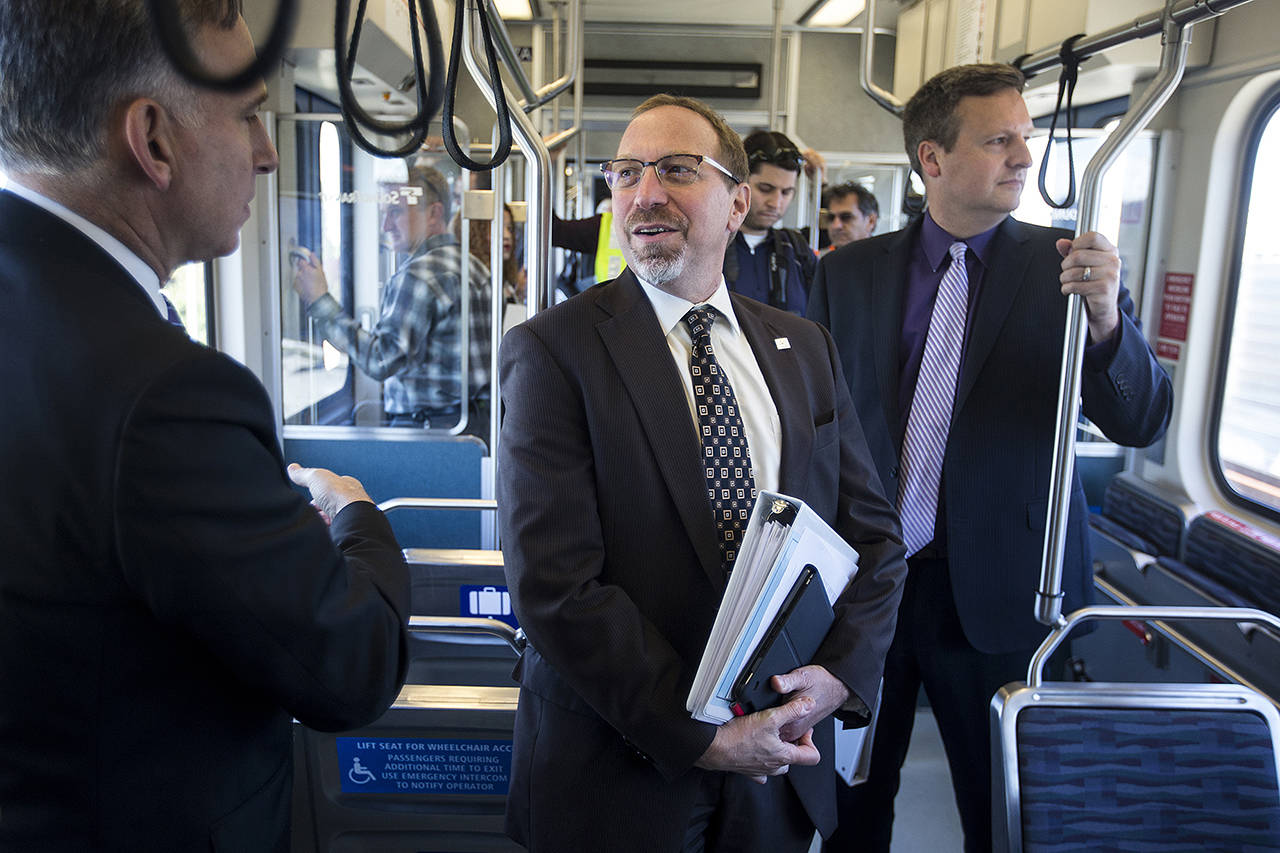By Mike Lindblom / The Seattle Times
Sound Transit’s ridership stopped growing this year, many downtown station escalators and elevators don’t work and the National Transportation Safety Board (NTSB) primarily blamed the agency for failing to prevent a fatal Amtrak derailment two years ago in DuPont, Pierce County.
Despite those problems, the transit board is scheduled to award CEO Peter Rogoff an “excellent” rating and $6,000 bonus Thursday, along with a 4% annual raise, boosting his 2020 pay to about $385,000.
Why these rewards?
The board’s criteria emphasize regional relationships, timely communication with the board and a collaborative “tone at the top” for staff — areas where board members say he’s excelling now.
Three years ago, shortly after Rogoff moved here from Washington, D.C., staff complaints sparked an investigation into profanity, alleged sexism and abrasive behavior by Rogoff, so the board ordered him to complete executive coaching.
“He’s been getting greater participation from the public,” said Chairman John Marchione, the Redmond mayor. “He’s made improvements in the organizational culture. Peter’s ratings by employee surveys went way up.”
Marchione cited new coalitions of local elected officials who help guide future I-405 bus rapid transit and future West Seattle and Ballard light-rail alignments.
Construction began this year for the Northgate-to-Lynnwood light-rail extension, and the agency secured $1.4 billion in Federal Transit Administration (FTA) grants and loans toward the Angle Lake-to-Federal Way line. Those lines are scheduled to open in 2024, adding 90,000 boardings at seven stations.
“At a time when the federal government is not doing much to fund these kinds of systems, we’ve been successful working with FTA,” said board member Paul Roberts, an Everett City Council member.
As for escalators, Sound Transit approved a long-term, $52 million program, mainly to retrofit 36 escalators and 22 elevators now owned by King County Metro Transit after Sound Transit takes ownership.
But for now, Sound Transit’s light-rail riders still sidestep yellow barricades and stalled conveyances within the 30-year-old transit tunnel, where one-fourth are out of order.
“It’s not acceptable, and the traveling public deserves conveyances which carry passengers to the trains,” Marchione said.
Fast approaching is the Connect 2020 project, beginning Jan. 4, when track construction forces 30,000 of the agency’s 80,000 light-rail riders to change trains in the median of Pioneer Square Station, or exit there. Contractors will spend 10 weeks building track connections one station south, to meet the 2023 Bellevue-Overlake route along I-90.
Three Pioneer Square escalators there were dead Tuesday morning, but Metro’s deputy director, Bill Bryant, said all escalators at that station will be fixed by January.
Sound Transit hired a new escalator-maintenance firm in September and reports 98% reliable performance at stations it owns, including the 13-escalator University of Washington Station. Rogoff on Wednesday met with the advocacy nonprofit Rooted in Rights to discuss station access for people with mobility limitations.
Escalator failures were “part of the conversation” in the executive committee’s evaluation last week, Marchione said.
Rogoff inherited the downtown problem from Metro, ahead of the handover in mid-2020.
“We are very concerned about the performance of escalators and we are working with Metro in hopes performance is improved, especially before Connect 2020,” said Geoff Patrick, Sound Transit communication director.
The NTSB this year concluded Sound Transit, owners of the new $181 million trackway from Tacoma to Nisqually, should have assured Amtrak crews were better trained, or waited for positive train control that can stop a speeding train, before inaugurating trips through the corridor Dec. 18, 2017.
That morning, a southbound train carrying 80 passengers flew off a curve near I-5, killing three rail enthusiasts on Amtrak Cascades, a train service funded by the Washington State Department of Transportation.
Rogoff this year commissioned an independent investigation and reported that “Sound Transit staff wrongly believed that WSDOT, not Sound Transit, was responsible for overseeing all activities related to Amtrak training and qualifications.” Rogoff removed Sound Transit’s safety and quality control director and is forming a separate safety division.
“When you have a problem you run toward it. That’s the mindset of a first responder. He did that,” Roberts said.
Unfinished business to improve safety culture played a role in Rogoff missing the top score of “outstanding,” Marchione said.
Sound Transit’s entanglement in Initiative 976, intended to slash car-tab taxes to $30 statewide, played no role in the evaluation, Marchione said.
An overall majority of voters within the transit district favored keeping current taxes, including a Sound Transit tax of $110 per $10,000 of vehicle value, inflated for newer cars. But a majority within Pierce and Snohomish counties favored tax cuts. Sound Transit intends to keep collecting car-tab revenue to fulfill bond contracts.
Ridership counts, not in the board’s criteria, are down 0.4% for the first three-quarters of 2019. Light-rail trips increased 2.2%, but express-bus use dipped 4.2%, led by a 2,000-rider loss when Bellevue-Seattle Route 550 was evicted from the transit tunnel onto slower streets. Sounder commuter train use slipped 0.5%.
Regional boardings for eight transit agencies in a four-county region are down 1% this year, after the Seattle region this decade boasted the nation’s strongest transit growth.
Rogoff’s current salary is $365,000, plus retirement pay and benefits, as of Dec. 1.
Sound Transit is attempting the nation’s largest transit expansion, and grew by 213 staffers to a total 1,081 this year, while collecting and spending about $2 billion annually.
British Columbia TransLink CEO Kevin Desmond earned $316,424 last year. King County Metro General Manager Rob Gannon made $218,149 in 2018 and Philip Washington, CEO of Los Angeles Metro, made $350,000 in 2017.
Talk to us
> Give us your news tips.
> Send us a letter to the editor.
> More Herald contact information.

























